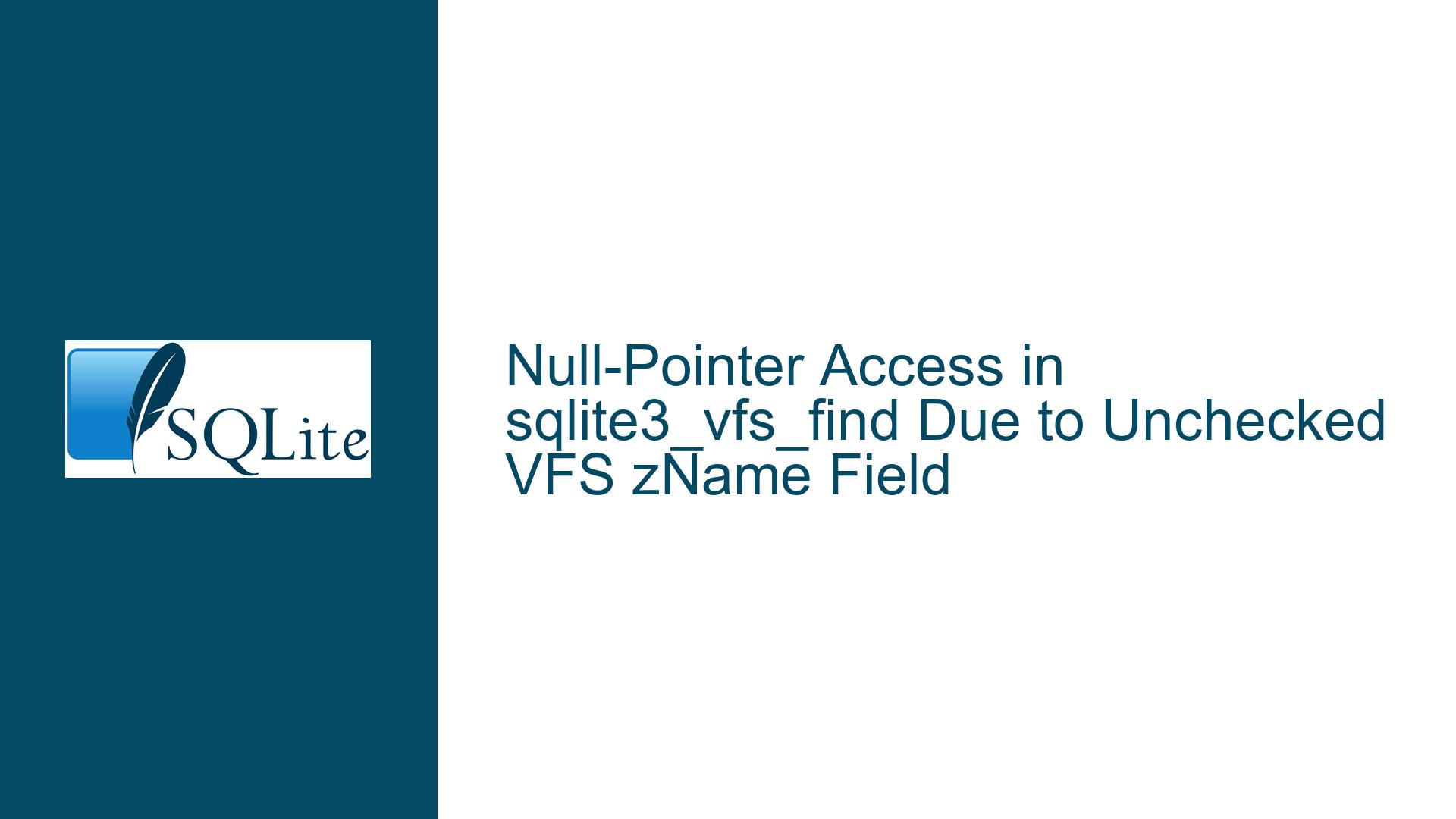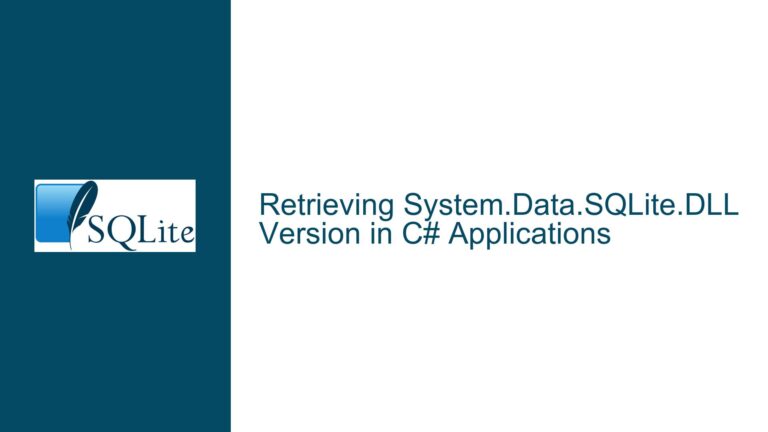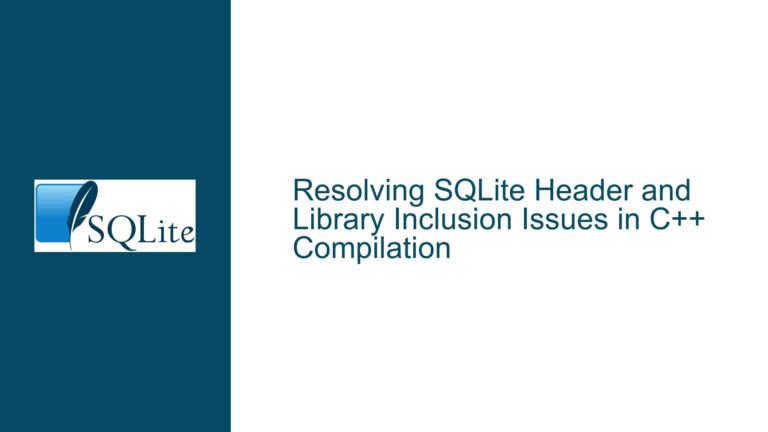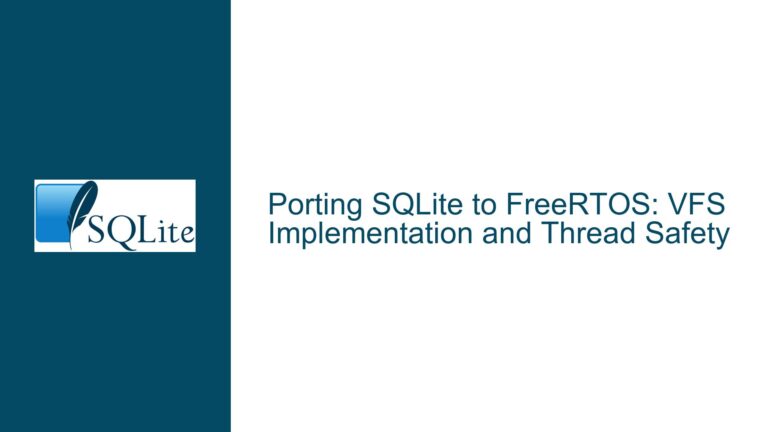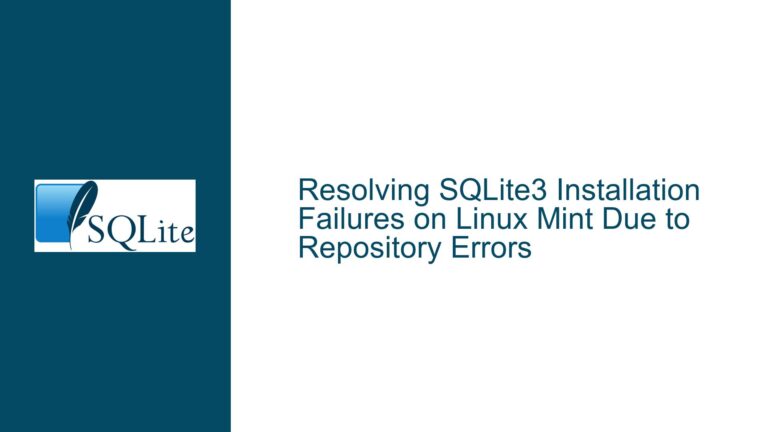Null-Pointer Access in sqlite3_vfs_find Due to Unchecked VFS zName Field
Null-Pointer Access in sqlite3_vfs_find Due to Unchecked VFS zName Field
Undefined Behavior Triggered by sqlite3_vfs_find When Iterating Over Registered VFS Entries
The sqlite3_vfs_find function is designed to locate a registered Virtual File System (VFS) by name. A critical vulnerability arises when this function attempts to compare a user-provided VFS name (zVfs) against entries in the global VFS list (vfsList). The function uses strcmp to compare zVfs with the zName field of each registered VFS. However, the SQLite codebase does not enforce that the zName field of registered VFS entries is non-null. If a VFS with a NULL zName is registered, sqlite3_vfs_find will dereference this null pointer during the strcmp operation, resulting in a segmentation fault (SIGSEGV). This violates the principle of defensive programming, as the function assumes all registered VFS entries have valid zName pointers when iterating through the list. The SQLite documentation states that registering a VFS with a NULL or empty zName leads to undefined behavior, but the absence of runtime checks allows this scenario to manifest as a crash during normal operation or fuzzing.
Inadequate Validation of VFS Metadata During Registration and Lookup Operations
The root cause of this crash lies in two related issues:
- Lax Enforcement of VFS Registration Requirements: The
sqlite3_vfs_registerfunction does not validate that thezNamefield of the VFS being registered is non-null. While the SQLite API documentation warns against registering VFS entries withNULLor empty names, the implementation itself does not reject such registrations. This creates a situation where invalid VFS entries can exist in the global list, violating assumptions made by other parts of the codebase. - Unsafe String Comparison in VFS Lookup Logic: The
sqlite3_vfs_findfunction fails to verify that thezNamefield of each VFS entry is non-null before performing astrcmpoperation. This oversight directly enables null pointer dereferencing when iterating over the VFS list. The function correctly checks whether the inputzVfsparameter is null (to return the default VFS), but it does not apply the same caution to thezNamefields of registered VFS entries.
These issues are compounded by the fact that SQLite’s VFS registration mechanism allows multiple VFS entries to coexist, including those with invalid metadata. The interaction between these design choices creates a failure mode where a single malformed VFS registration can destabilize the entire database engine during subsequent lookup operations.
Mitigating the Null-Pointer Dereference Through Defensive Coding Practices and API Hardening
To resolve this issue, developers must address both the registration and lookup phases of VFS handling:
Step 1: Validate VFS Metadata During Registration
Modify the sqlite3_vfs_register function to explicitly reject VFS entries with NULL or empty zName fields. This aligns the implementation with the documentation’s warning about undefined behavior for such cases. If a VFS is intended to serve as the default, the registration logic should explicitly handle this by overriding the default VFS pointer without requiring a NULL zName. For example:
if( zName == NULL || *zName == '\0' ){
sqlite3GlobalConfig.pVfs = pVfs; // Set as default VFS
} else {
// Add to vfsList with non-empty zName
}
This approach eliminates the possibility of registering VFS entries with invalid zName values while preserving the ability to designate a default VFS.
Step 2: Implement Defensive Checks in sqlite3_vfs_find
Even with stricter registration checks, legacy code or third-party extensions might still attempt to register invalid VFS entries. To guard against this, modify the loop in sqlite3_vfs_find to skip entries with NULL zName fields when searching for a non-default VFS:
for(pVfs = vfsList; pVfs; pVfs = pVfs->pNext){
if( zVfs == 0 ) break;
if( pVfs->zName == NULL ) continue; // Skip invalid entries
if( strcmp(zVfs, pVfs->zName) == 0 ) break;
}
This ensures that only VFS entries with valid names are considered during the lookup process, preventing null pointer dereferences.
Step 3: Update Documentation to Reflect Runtime Constraints
Clarify the SQLite documentation to explicitly state that:
- The
zNamefield of a VFS passed tosqlite3_vfs_registermust be a non-null, non-empty string. - Registering a VFS with
zNameset toNULLor an empty string will result in an error or be silently ignored, depending on implementation choices. - The default VFS is now designated through a separate mechanism (e.g.,
sqlite3_vfs_set_default), decoupling default designation from name validity.
Step 4: Add Regression Tests for VFS Registration Edge Cases
Develop test cases that attempt to register VFS entries with NULL and empty zName fields, verifying that these attempts fail gracefully. Additional tests should confirm that sqlite3_vfs_find correctly skips invalid entries and does not crash when malformed VFS entries are present in the list.
Step 5: Audit Existing Code and Third-Party Extensions
Review all uses of the VFS registration API within the SQLite codebase and associated extensions to ensure compliance with the new validation rules. This includes checking for implicit assumptions about the default VFS mechanism and updating legacy code that relied on the previous behavior.
By implementing these changes, SQLite becomes resilient to null pointer dereferences in sqlite3_vfs_find, even when faced with improperly registered VFS entries. This approach balances strict input validation with defensive programming practices, ensuring robustness without sacrificing flexibility.
